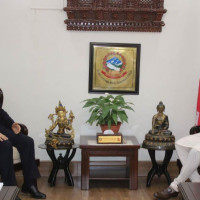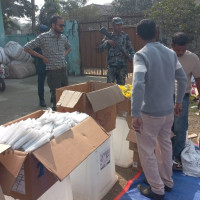- Thursday, 26 February 2026
Exporting Youth And Importing Crisis
In today’s global economy, the young minds of the Global South are being packed, processed, and exported on an industrial scale. Nepal, a small Himalayan nation, once celebrated for its self-reliant communities, now stands as a textbook case of how neoliberal globalisation dismembers nations from within, not through war or famine, but by seducing its youth into overseas under the banner of “foreign education.”
According to Nepal’s Ministry of Education, more than 125,000 No Objection Certificates (NOCs) were issued in 2023 alone. It’s huge because the number of students who pass the grade 12 exam in the same year or the preceding year is not more than 200,000. Similarly, a staggering Rs 64.15 billion (USD 500 million) was spent on study abroad in just seven months of the 2024-25 fiscal year. The corridors of Kathmandu are lined with "IELTS" banners and "Study in Australia" posters, while Nepal’s public universities — once hubs of activism and critical thought — are struggling to prove their relevance.
Failed promise
Our youths are not just seeking degrees abroad; they are fleeing a failed promise at home. But who gains from this exodus? Certainly not Nepal. In classical colonialism, raw materials were shipped to Europe; today, it’s brains and bodies. The export of students from Nepal is part of what can be called a "migration-industrial complex" — an intricate alliance of education institutes, Western universities, and Nepali middlemen. All of these profit from the commodification of aspiration. This new colonial arrangement turns education into a migration visa, and young students into cheap labour in the service economies of the Global North.
This isn’t just a cultural trend; it’s a structural trap. David Harvey’s theory of neoliberalism explains how public goods—like education—are turned into private commodities. Add to that Samir Amin’s thesis on the “development of underdevelopment,” and it becomes clear: the North develops at the expense of the South’s stagnation. Every student who leaves Nepal to mop hospital floors in Melbourne or code for Canadian firms is another chapter in this asymmetrical exchange. Proponents of international education sell a dream: global skills, intercultural exposure, and higher income. But who pays the price? Field research shows that 65 per cent of students take on heavy debt, many relying on family members to mortgage land or sell livestock.
Once abroad, students face long hours in precarious jobs, cultural isolation, and racist policies. The average tuition for a Nepali student in Australia is AUD 40,000 per year; multiply that by tens of thousands, and you see capital flight on a national scale. Ironically, these students—many of whom come from upper-caste, urban, relatively affluent families—are rarely those left behind to rebuild Nepal. Instead, the country loses its best-educated youth, while local education and labour sectors are hollowed out. The push factors are obvious: unemployment, politicised universities, poor quality education, and corruption. But what is often missed is how these internal crises are shaped by external ideologies.
Western hegemonic discourse pervades Nepal’s education discourse—students are taught to value migration as the pinnacle of success. Families invest in study abroad not for learning, but for permanent residency. A student’s degree becomes a social passport, conferring prestige upon return, even if no knowledge is gained or remittances sent. Peer pressure, consultancy manipulation, and the glamorisation of foreign lifestyles on TikTok or YouTube have transformed education into a status symbol, not a tool for emancipation. This is false consciousness, a Marxist would say, manufactured through capitalist media and neoliberal policy.
This trend is not uniquely Nepali, though. Across the Global South, countries like Bangladesh, Nigeria, and the Philippines are witnessing the same haemorrhaging of human capital. The OECD reports that over six million students were studying abroad in 2023, with only a tiny fraction ever returning home. The North builds “diverse campuses” while the South loses its public intellect. This isn’t a brain drain; it’s a brain theft, organised through legal and commercial means, sanitised by the language of "global citizenship."
Delinking
The answer is not to ban student migration, but to decolonise the development model. Nepal must reject the doctrine that salvation lies in the West. Instead, we need a huge investment in public universities, transforming them into spaces of critical thinking and innovation; a state-led employment programme, especially in sectors like agriculture, education, and health; regulation of education consultancies, with penalties for fraud and false advertising; and incentives for return migration, linked to meaningful public service, not symbolic awards.
Above all, Nepal must embrace the principle of delinking articulated by Samir Amin, reorienting its economy away from dependence on external validation and towards self-reliance and sovereignty. This isn’t just a policy question—it’s a political choice. The tragedy of our time is not that youth are leaving—it is that we have convinced them there is nothing worth staying for. The hill villages of Nepal are empty not just because of poverty, but because of a profound ideological defeat. The progressives, the state, and civil society must reclaim education as a site of resistance, not resignation. Nepal’s youth don’t lack ambition—they lack alternatives. It’s time we built them within the country.
(Pokharel is a researcher and activist working on agriculture and peasantry, youth migration, and peasant resistance in South Asia.)





-square-thumb.jpg)







-original-thumb.jpg)


